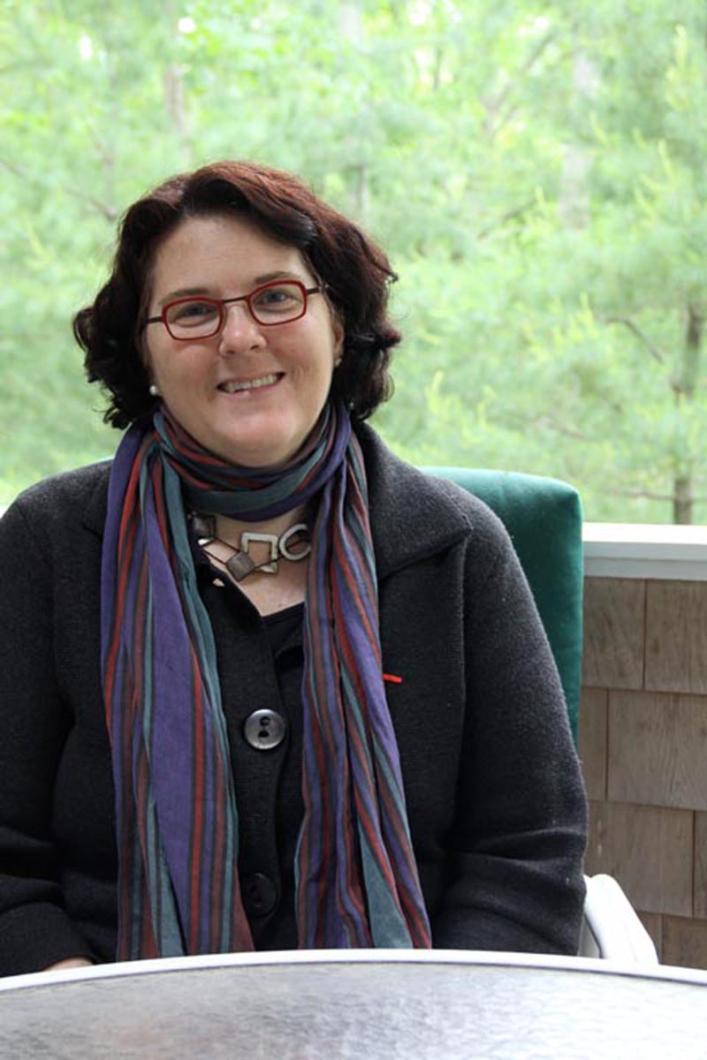On the way out her apartment door in Boston for Christmas vacation, Caitlin Hawke grabbed the mail and started sifting through it on the elevator, suitcase at her side.
One letter in particular got her attention.
“I read it, and reread it, and thought, why can’t I understand this?” she said. “It was like I couldn’t compute the words. Then the third time I read it my heart started beating fast . . . I was just shocked.”
A few months later, on March 31, the promise of the letter came true as Ms. Hawke was bestowed with the highest decoration of France, the Legion of Honor. The order was established by Napoleon Bonaparte in 1802 and is typically reserved for French citizens. At her request, she was given the award at her father’s home in Washington, D.C. (recipients of the award can choose the site of the ceremony).
Coming from across the country and globe to celebrate sat colleagues, mentors, family members, Nobel Prize winners, and a few friendly faces from the Vineyard—her second home where she has spent summers since 1969.
After personal and kind remarks from the French Ambassador to the U.S., Mademoiselle Marie-Helene March—Ms. Hawke’s professional mentor—looked her protege intensely in the eye as she recited in French: “On behalf of President of the Republic and in light of the powers vested in me, we make you Chevalier of the Legion of Honor.”
“I could feel the entire country of France behind these words,” Ms. Hawke said.
After studying human paleontology and archeology at the University of Pennsylvania, Ms. Hawke spent several summers digging in France. During her first visit to a seaside city in Brittany, the air, climate, geology and fishing culture reminded Ms. Hawke of the Vineyard, and she felt right at home.
Her relationship with the country continued long after her summer explorations. Back in the United States she searched for a job with a French organization, and found her niche in New York city at the Pasteur Foundation, an American nonprofit affiliate of the Institut Pasteur in France, an institution founded by Louis Pasteur in 1887 that strives to prevent and treat infectious diseases through biological research.
As executive director of the organization for 22 years, Hawke established three exchange programs for American post-doctoral scientists to do basic biological research in Paris. The programs brought over more than 30 scientists for three-year stays in the country. Numerous patents, journal publications, novel work and basic research resulted from the exchange.
Creating the opportunity for scientists to work together internationally is what Ms. Hawke believed caught the attention of those who award the Legion of Honor.
“France takes its relationship with the U.S. very seriously,” Ms. Hawke said. “Programs like the exchange where the U.S. is going to France for once was something they took note of.”
For the post-doctorates, going from a large American lab where products can be ordered overnight and experiments started the next day, to a small French lab where a different language is spoken and resources are less accessible is quite a transition.
“It takes an ambitious and flexible person to even think of doing this,” Ms. Hawke said of the participants in the program. “It may not be the fastest way to get your experiments conducted, but you get a completely different perspective on your science and your country.”
During the exchanges, Ms. Hawke would make a point to get to know the post-docs and stay in touch so when they integrated back into the American laboratories, the foundation would have a rich network of experienced scientists.
Also, as executive director, she established the Pasteur Foundation Award, which is given at the annual gala to policymakers and leaders for their dedication to public health research and awareness. In addition to recognizing President Clinton and President Mandela, the Pasteur Foundation presented the award to the late Ambassador Richard Holbrooke for his work fighting AIDS, tuberculosis and malaria, and Muhammad Yunus, a pioneer of microcredit and a major contributor to public health and awareness.
When Ms. Hawke heard of her recognition by the country of France, she was unprepared, to say the least.
“I was utterly flabbergasted,” she said. “I worked hard but I didn’t think about it in terms of recognition. I was just doing my job, and that’s what makes it very, very special.”
Debby Ware, a long-time friend who attended the ceremony, recalls hiring Ms. Hawke right out of college to work at her shop, Rainy Day in Vineyard Haven, because she immediately felt something special from her.
“Out of everyone I know in my life, Caitlin’s going to change the world. And I don’t think working at Rainy Day had much to contribute to it,” she laughed.
More than 20 years since her summer at the shop, Ms. Hawke and her family still call the Vineyard home for a few months a year. Her mother is buried here, and her father, Jerry Hawke continues to keep secret his bluefish recipe that has won a bounty of blue ribbons at the Martha’s Vineyard Agricultural Society Fair.
During her ceremony, Ms. Hawke quoted Marguerite Yourcenar from Memoirs of Hadrian: “The true birthplace is that wherein for the first time one looks intelligently upon oneself.”
For Ms. Hawke, that’s two places.
“It’s not where you’re born or where you come from, it’s where you have a self realization,” Ms. Hawke said. “For me in many ways that’s France. I understood my country better, I understood myself and my capacity to communicate better. But in so many ways it is the Vineyard, too. It’s such a reflective place. Everyone is well here… everyone is kind of at one.”




Comments
Comment policy »